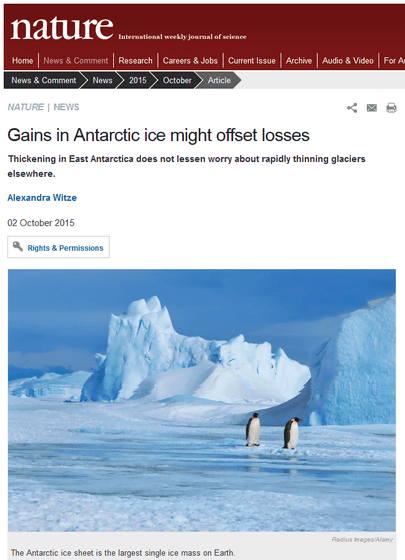Antarctic ice is increasing in part and the possibility of offsetting missing ice emerges

ByReeve Jolliffe
The ice sheet of Antarctica is the largest ice bulk on the planet, but the problem of ice melting gradually due to global warming in recent years has arisen. However, in some parts of Antarctica it was revealed that the ice layer became thicker.
Gains in Antarctic ice may offset losses: Nature News & amp; Comment
http://www.nature.com/news/gains-in-antarctic-ice-might-offset-losses-1.18486

Due to the global temperature rise, not only in Antarctica but also near the North PoleThe speed with which glaciers melt in Greenland is faster than beforeAlthough the problem is occurring, a theory that the ice layer becomes thicker than before in the eastern part of Antarctica was confirmed, and the amount of ice melting out from the whole Antarctica may be canceled out doing.
According to Jay Zwally, a glaciologist who is conducting research at NASA 's Goddard Space Center, Antarctica ice has repeatedly melted and frozen and has been balanced for a long time, but recent global warming The melting speed of the ice has become faster than before. In 2012the studyAccording to the calculation of the amount of ice in Antarctica based on aerial photographs taken between 2003 and 2008, it has been found that 72 billion tons of ice has melted every year.
In the meantime, Mr. Zwally ran from 1992 to 2001European Space AgencyofEuropean remote sensing satelliteAnd the data collected by NASA's observation satellite from 2003 to 2008ICESatAnalyzed data collected by. Then it seems that 82.0 billion tons of ice is newly born every year in Antarctica. The most ice on the eastern side of Antarctica was born, followed by many in the west side.
Normally, snow falling on the ice will solidify by its own weight, and a layer of glaciers will form, but the phenomenon of ice increase discovered this time is that the snow which fell about 10,000 years ago on ice It slowly solidifies and it is part of the glacier by falling into the sea. Currently, annual glaciers are increasing only a few centimeters thick each year, no major impact has occurred, but it may be that the area of Antarctica may have spread over thousands of years, Mr. Zwally predicts doing.

ByDavid Stanley
However, Mr. Zwally says, "People who support global warming denial theory may begin to say that" There is no worry about global warming ", but since the part where ice is increasing is found That does not mean that all problems with Antarctica have been solved. " As the temperature of the earth rises, the sea level around the Antarctic continues to rise as Antarctic ice melts out, but the exact timing and influence of global warming affecting Antarctica is still clear I do not know.
NASA's satelliteGRACEFrom the latest data collected, the Antarctic ice is expected to continue to melt in the future, and it is simply "to offset the amount of ice that melts under the influence of global warming, with the ice that ancient snow froze I do not seem to be able to say "I will do."

ByLiam Quinn
Related Posts:
in Science, Posted by darkhorse_log







